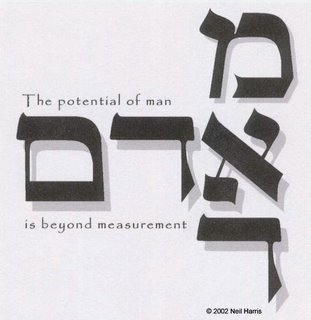OK, I know, it’s a long title. The truth is that this posting has been brewing in my press pot of a long time. I hope that my few readers will allow me to go in a slightly different direction just for one posting. Rav Yisrael Salanter’s final two midos are coming very soon.
Fact: Whenever I post a comment on my own blog, the following message appears in my Hotmail inbox:
The sender of this message, neilsharris@hotmail.com, could not be verified by Sender ID. Learn more about Sender ID.
From: Neil Harris
Sent : Monday, August 21, 2006 9:57 PM
To : neilsharris @ hotmail.com
Subject : [Modern Uberdox] 8/21/2006 09:57:46 PM
Could not be verified by Sender ID?!? What’s this all about?
Hotmail doesn’t recognize my email address when I post a comment to my blog. You’ve got to be kidding.
During Elul, it seems that introspection is about as commonplace as the ads for a new Sukkah in any great Jewish newspaper.
Not recognizing yourself is usually a bad thing, right? I’m not so sure about that. If one approaches the Teshuva process and is successful, then we change who we are. If we change ourselves, then not recognizing who we once were is a great thing.
As I reflect on the the past year (along with everyone else) I can divide the year into two different sections.
1) Life before moving to Chicago vs. Now living in Chicago
2) Life before blogging vs. Life as a blogger
Both sections share very common elements. In the moving to Chicago arena, I’ve been given an opportunity to start fresh in terms of who I am, and what identity I make for myself and my family. While we moved here knowing a few people, it’s really an open book.
The blogging arena is also much the same. By posting on a blog you reinforce your own identity. Or create a new one.
Plenty of people have very solid and legitimate reasons for blogging Anonymous. I greatly respect that.
I chose the other path. I use my name. I’ll be honest, one reason is that I want to be heard. I don’t mind saying this, only because I could have just as easily written this posting in a journal and kept it on a shelf (I’ve, in fact, kept journals for years). As a result of blogging I’ve been able to write more in the past four and a half months than I’ve written in the past four and a half years. This is a major accomplishment for me. Another reason is that using my own name helps keep me in check so I write as truthfully as I can and I don’t use my blog to slam others or go off on them for whatever reason sounds good at the time.
I do wonder if people who read my blog have some image of me that isn’t quite who I really am?
Cute quote time….
“I am not who I think I am; I am not who you think I am; I am who I think you think I am.” (I heard that it was written by Goethe)
I’ve thought about this line many times since I started my blog. It totally applies to the blogosphere. Bloggers blog about different things. Each blog reveals a little about someone. Some blog about personal issues, others about d’vrai Torah, others about their family, others about social issues. We all have something to say.
One blogger, who I respect and admire for their quality of writing, Torah knowledge, and overall menshlikeit mentioned to me “that what we blog is not who we are, but what is at our essence”.
Just think about that statement for a second…
Let’s take my blogs’ name. It’s is really a humorous label. It’s a phrase that I hadn’t seen used before and I thought it was catchy, in light of the fact that we live in a generation of people trying to Uber-Frum themselves in the eyes of others. In the 12th chapter of EYES TO SEE, (thanks to my friend in Atlanta for turning me on to the book when it came out) Rabbi Yom Tov Schwartz writes about the “Selectively Pious” Jews out there who pick and choose different aspects of Bein Adam L’chavero and Bein Adam L’makom to observe. Both types of Mitzvos are of equal importance. I try to bring that out in what I write about.
Remember when you first created you blog? I do. I debated about what to write for the blog description in the “settings” section. I finally settled on “ideas about Kehillah, Hashkafa, and Avodas Hashem”. Pretty general and not too creative. What I didn’t realize then was that Kehillah would end up referring to the online community and bond that bloggers create.
So back to my problem with Hotmail…Why won’t it verify who I am? I think the answer is that neilsharris at hotmail.com doesn’t refer to the real me. It’s just an address. And not even a physical address. You can’t Maquest an email address. It doesn’t reference where I am or where I live. While devarim or words (written or spoken) reveal one’s machshavos or thoughts, an email address reveals nothing. It’s just something on a screen that can be deleted. I find this lesson to be great mussar for myself. What I think of as my identity isn’t really an identity at all.
It’s Elul, and I need to figure out who I am and where I am.
Reb Nachman writes in Likutey Moharan that “You are wherever your thoughts are. Make sure your thought are where you what to be.”
If interested in buying a copy of EYES TO SEE, it’s available at most seforim stores or online here.



